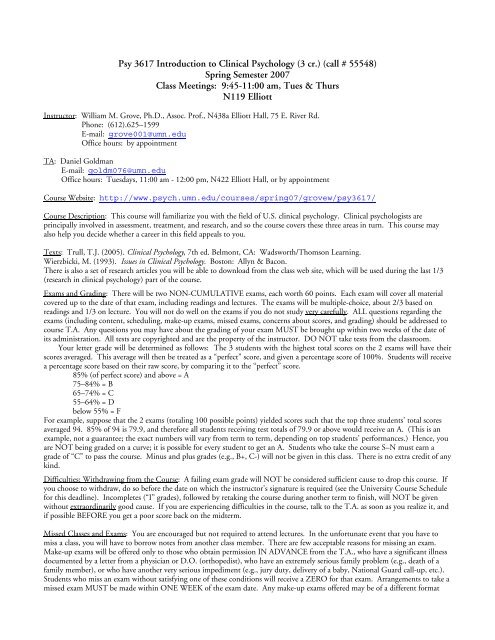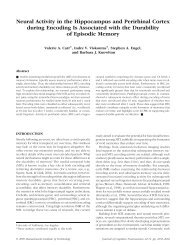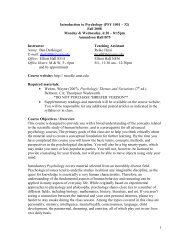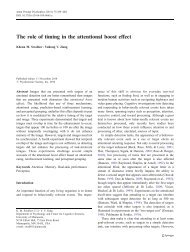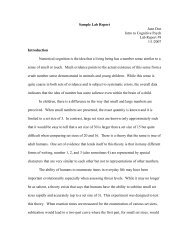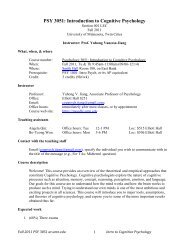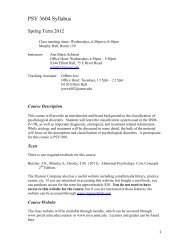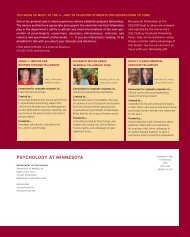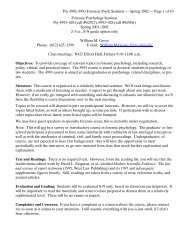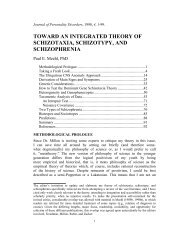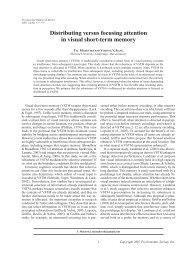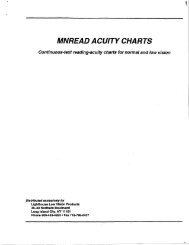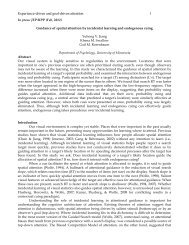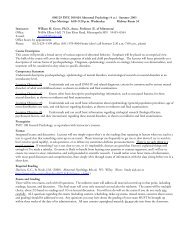Psy 3617 Introduction to Clinical Psychology (3 cr.) (call # 55548)
Psy 3617 Introduction to Clinical Psychology (3 cr.) (call # 55548)
Psy 3617 Introduction to Clinical Psychology (3 cr.) (call # 55548)
Create successful ePaper yourself
Turn your PDF publications into a flip-book with our unique Google optimized e-Paper software.
<strong>Psy</strong> <strong>3617</strong> <strong>Introduction</strong> <strong>to</strong> <strong>Clinical</strong> <strong>Psy</strong>chology (3 <strong>cr</strong>.) (<strong>call</strong> # <strong>55548</strong>)<br />
Spring Semester 2007<br />
Class Meetings: 9:45-11:00 am, Tues & Thurs<br />
N119 Elliott<br />
Instruc<strong>to</strong>r: William M. Grove, Ph.D., Assoc. Prof., N438a Elliott Hall, 75 E. River Rd.<br />
Phone: (612).625–1599<br />
E-mail: grove001@umn.edu<br />
Office hours: by appointment<br />
TA: Daniel Goldman<br />
E-mail: goldm076@umn.edu<br />
Office hours: Tuesdays, 11:00 am - 12:00 pm, N422 Elliott Hall, or by appointment<br />
Course Website: http://www.psych.umn.edu/courses/spring07/grovew/psy<strong>3617</strong>/<br />
Course Des<strong>cr</strong>iption: This course will familiarize you with the field of U.S. clinical psychology. <strong>Clinical</strong> psychologists are<br />
principally involved in assessment, treatment, and research, and so the course covers these three areas in turn. This course may<br />
also help you decide whether a career in this field appeals <strong>to</strong> you.<br />
Texts: Trull, T.J. (2005). <strong>Clinical</strong> <strong>Psy</strong>chology, 7th ed. Belmont, CA: Wadsworth/Thomson Learning.<br />
Wierzbicki, M. (1993). Issues in <strong>Clinical</strong> <strong>Psy</strong>chology. Bos<strong>to</strong>n: Allyn & Bacon.<br />
There is also a set of research articles you will be able <strong>to</strong> download from the class web site, which will be used during the last 1/3<br />
(research in clinical psychology) part of the course.<br />
Exams and Grading: There will be two NON-CUMULATIVE exams, each worth 60 points. Each exam will cover all material<br />
covered up <strong>to</strong> the date of that exam, including readings and lectures. The exams will be multiple-choice, about 2/3 based on<br />
readings and 1/3 on lecture. You will not do well on the exams if you do not study very carefully. ALL questions regarding the<br />
exams (including content, scheduling, make-up exams, missed exams, concerns about scores, and grading) should be addressed <strong>to</strong><br />
course T.A. Any questions you may have about the grading of your exam MUST be brought up within two weeks of the date of<br />
its administration. All tests are copyrighted and are the property of the instruc<strong>to</strong>r. DO NOT take tests from the classroom.<br />
Your letter grade will be determined as follows: The 3 students with the highest <strong>to</strong>tal scores on the 2 exams will have their<br />
scores averaged. This average will then be treated as a “perfect” score, and given a percentage score of 100%. Students will receive<br />
a percentage score based on their raw score, by comparing it <strong>to</strong> the “perfect” score.<br />
85% (of perfect score) and above = A<br />
75–84% = B<br />
65–74% = C<br />
55–64% = D<br />
below 55% = F<br />
For example, suppose that the 2 exams (<strong>to</strong>taling 100 possible points) yielded scores such that the <strong>to</strong>p three students’ <strong>to</strong>tal scores<br />
averaged 94. 85% of 94 is 79.9, and therefore all students receiving test <strong>to</strong>tals of 79.9 or above would receive an A. (This is an<br />
example, not a guarantee; the exact numbers will vary from term <strong>to</strong> term, depending on <strong>to</strong>p students’ performances.) Hence, you<br />
are NOT being graded on a curve; it is possible for every student <strong>to</strong> get an A. Students who take the course S–N must earn a<br />
grade of “C” <strong>to</strong> pass the course. Minus and plus grades (e.g., B+, C-) will not be given in this class. There is no extra <strong>cr</strong>edit of any<br />
kind.<br />
Difficulties; Withdrawing from the Course: A failing exam grade will NOT be considered sufficient cause <strong>to</strong> drop this course. If<br />
you choose <strong>to</strong> withdraw, do so before the date on which the instruc<strong>to</strong>r’s signature is required (see the University Course Schedule<br />
for this deadline). Incompletes (“I” grades), followed by retaking the course during another term <strong>to</strong> finish, will NOT be given<br />
without extraordinarily good cause. If you are experiencing difficulties in the course, talk <strong>to</strong> the T.A. as soon as you realize it, and<br />
if possible BEFORE you get a poor score back on the midterm.<br />
Missed Classes and Exams: You are encouraged but not required <strong>to</strong> attend lectures. In the unfortunate event that you have <strong>to</strong><br />
miss a class, you will have <strong>to</strong> borrow notes from another class member. There are few acceptable reasons for missing an exam.<br />
Make-up exams will be offered only <strong>to</strong> those who obtain permission IN ADVANCE from the T.A., who have a significant illness<br />
documented by a letter from a physician or D.O. (orthopedist), who have an extremely serious family problem (e.g., death of a<br />
family member), or who have another very serious impediment (e.g., jury duty, delivery of a baby, National Guard <strong>call</strong>-up, etc.).<br />
Students who miss an exam without satisfying one of these conditions will receive a ZERO for that exam. Arrangements <strong>to</strong> take a<br />
missed exam MUST be made within ONE WEEK of the exam date. Any make-up exams offered may be of a different format
than the in-class exam, e.g., they may contain oral or essay questions. Missed make-up exams will be graded as ZERO, and will<br />
NOT be rescheduled. THERE ARE NO EXCEPTIONS TO THE POLICIES STATED HERE.<br />
<strong>Psy</strong> <strong>3617</strong> <strong>Introduction</strong> <strong>to</strong> <strong>Clinical</strong> <strong>Psy</strong>chology Lecture TENTATIVE Schedule Spring Semester, 2007<br />
Week Date Topic Reading Assignment<br />
1 1/16 His<strong>to</strong>ry of <strong>Clinical</strong> <strong>Psy</strong>chology Trull Ch. 2<br />
1/18 Training I Trull Ch. 1, 3<br />
2 1/23 Training II; Research Methods I Trull Ch. 4<br />
1/25 Research Methods II; Intellectual Assessment I Trull Ch. 6 “Reliability and Validity of Interviews” (pp.<br />
163-171); Trull Ch. 11 “<strong>Psy</strong>chotherapy Research” (pp.<br />
312-321)<br />
3 1/30 Intellectual Assessment II Trull Ch. 7<br />
2/1 Personality Assessment I Trull Ch. 8<br />
4 2/6 Personality Assessment II Wierzbicki Ch. 4<br />
2/8 Personality Assessment III Wierzbicki Ch. 6<br />
5 2/13 Diagnostic Assessment Trull Ch. 5<br />
2/15 Diagnostic Assessment II; Assessment Controversies I Trull Ch. 10; Wierzbicki Ch. 4<br />
6 2/20 Assessment Controversies II Wierzbicki Ch. 6<br />
2/22 Midterm Exam<br />
7 2/27 Traditional <strong>Psy</strong>chotherapy I Trull Ch. 11 (pp. 292–312); Trull Ch. 12<br />
3/1 Traditional <strong>Psy</strong>chotherapy II Trull Ch. 13<br />
6 3/6 Behavioral Therapy I Trull Ch. 14 (pp. 374-389)<br />
3/8 Behavioral Therapy II Trull Ch. 9<br />
3/12<br />
<strong>to</strong><br />
3/16<br />
Spring Break<br />
8 3/20 Cognitive Therapy I Trull Ch. 14 (pp. 389-407)<br />
3/22 Cognitive Therapy II Nothing additional<br />
9 3/27 Group, Couples, Family Therapies Trull Ch. 15<br />
3/29 Intervention Controversies I Wierzbicki Ch. 2<br />
10 4/3 Intervention Controversies II Nothing additional<br />
4/5 Biological Etiology Research I Hes<strong>to</strong>n “<strong>Psy</strong>chiatric disorders in foster home reared<br />
children of schizophrenic mothers” article; Fu et al.<br />
(1999)<br />
11 4/10 <strong>Psy</strong>chosocial Etiology Research I Tennant et al. “The role of life events in depressive<br />
illness” article<br />
4/12 <strong>Psy</strong>chosocial Research II Bruce et al. “Poverty and psychiatric status” article<br />
12 4/17 Cognitive Therapies II Nothing additional<br />
4/19 Assessment Research. I Sines “The relative contribution of four kinds of data <strong>to</strong><br />
accuracy in personality assessment” article<br />
13 4/24 Assessment Research II Albert et al. “Faking psychosis on the Rorschach” article<br />
4/26 Intervention Research I Elkin et al “NIMH Treatment of Depression
Collaborative Program” design article<br />
14 5/1 Intervention Research II Elkin et al “NIMH Treatment of Depression<br />
Collaborative Program” effectiveness article<br />
5/3 Research Controversies Robins & Guze “Establishment of diagnostic validity in<br />
psychiatric illness” article<br />
5/12 Final Exam 8:00–10:00am (SATURDAY)


